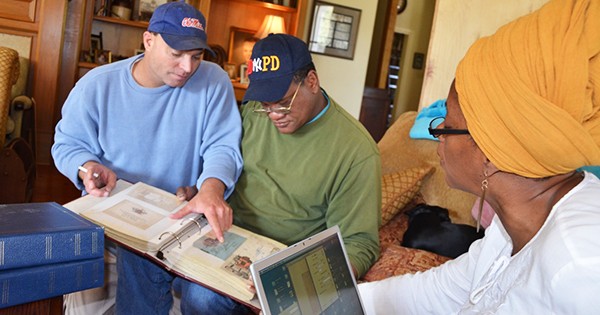
Karsten Simrall, Donald Jeffery, and Dr. Antoinette Harrell researching about Black families that still live on plantations
New Orleans, LA — Dr. Antoinette Harrell, known as the “Slavery Detective of the South,” is on a mission to interview and document the oral histories of people who still live on plantations to this very day. Deangelo Manuel and Tyra Climmons, two interns working with Harrell, visited two plantations in Tallahatchie County, Mississippi, interviewing people who still live on plantations. They set out to find out: Why are people still living on plantations? What is keeping them there, and why don’t they move away?The first person they stopped to interview was a woman named Helen, who was born on a plantation in 1940 in Holmes County, Mississippi. “I picked and chopped cotton until I left the plantation in 1959,” said Helen. “Mama and daddy never really got ahead, every year. They were told that the crops didn’t make good, try again. My mama and daddy left the plantation after the boss man sold the plantation.”
An older woman living on Buford Plantation said she moved from plantation to plantation with her mother before they settled on the Buford Plantation picking and chopping cotton. Climmons and Manuel were very shocked to see people living on a plantation in the age of the new millennium. Apparently, they just can’t afford to live anywhere else.
Due West Plantation, a plantation that consists of 12,000-acres, got its name many years ago. During the 1850s, the farm was part of the Twilight Plantation. Mike Sturdivant, the owner of the plantation, was a highly successful Delta planter and millionaire businessman. Matt Davis told Harrell his mother and father both were born on Due West Plantation. Davis’ grandfather, Richard Coleman, was a farmer from Lincoln County, MS, and went to the Delta searching for farm work, “My father Ladell Davis, Sr. was born in 1934 and worked as a tractor driver,” said Carrie Jean.
“Matt’s sister, Carrie Jean, was born on Due West Plantation; she remembers her grandma, Carrie’s own baby sucking one tittie and Mike’s son sucking on the other tittie,” said Carrie. “After I left the plantation and saw the television series Roots in 1977, I realized that I was living the same way,” she said. “We had what you called ‘across the tracks’; If you lived across the tracks on Due West Plantation, you were a slave. The other side of the tracks was the free side,” said Carrie Jean.
“Dr. Harrell researched the history of the original owner of Due West Plantation, Capt. Ben Sturdivant, and found him to be the Captain of the steamer J.M. Sharp,” according to the Yazoo Pass Expedition, February 14 to April 8, 1863, Capt. Sturdivant’s steamer J.M. Sharp. He was accompanied by Company C of the 20th Mississippi Infantry plus 200 slaves and their overseers.
The old wooden shacks were demolished, and small-framed brick homes were built in the 70s. Most people on Due West Plantation have other jobs off the plantation but still call the plantation home. Kirk Manuel asked Henry, a man who also lives on Due West, to tell him something about Emmitt Till’s story. To keep him anonymous, he will be referred to as Henry in this article.
“I heard about it through travelers,” said Henry. Henry said that he couldn’t believe that a person could do that to another human being. He lives just three miles from where they found Emmitt’s body. We learned about the Civil Rights Movement and Dr. Martin Luther King, Jr., through travelers, he said. “I left the plantation one time and returned back to the plantation because the city life was too much for a country boy. We didn’t communicate with folks on other plantations,” Henry added.
In May of 1968, dozens of wagons set out from Marks, Mississippi. Dr. Martin Luther King visited Clarksdale, Mississippi for the first major meeting of the Southern Christian Leadership Conference. While there, he saw the impoverish conditions black sharecroppers and tenant farmers who remained on plantations in the Delta faced daily.
“We didn’t leave the plantation for anything. We spent our coupons at the commissary store. If anyone ran away from the plantation, they left at night. You didn’t have any money to leave. I always wondered how they left,” he said. “After the conversation with Henry, we went to the store and met a man who had a different story but seemed very apprehensive about talking. All he would say was, ‘It was rough.’ He told us that his sister was hung, and he didn’t want to talk about it.”
Dr. Harrell regularly visited Ballground Plantation in Warren County, Mississippi, which consists of over 1500 acres. The Simrall family is the third owner of Ballground plantation. The Jeffery’s lived on this plantation for five generations. Donald Jeffery, who was born on Ballground Plantation, never knew any other place to call home. He and the present owner say they are like brothers. Donald still helps on the plantation but works somewhere else. Donald’s mother, Early Mae Jeffery, was one of the cooks and she rung the old plantation bell for Harrell to demonstrate how the bell was rung to call in the field hands.
For more details about Dr. Antoinette Harrell and her work, visit AntoinetteHarrell.com and PeonageDetective.com
PRESS CONTACT:
Dr. Antoinette Harrell
peonagedetective@gmail.com
504-858-4658
